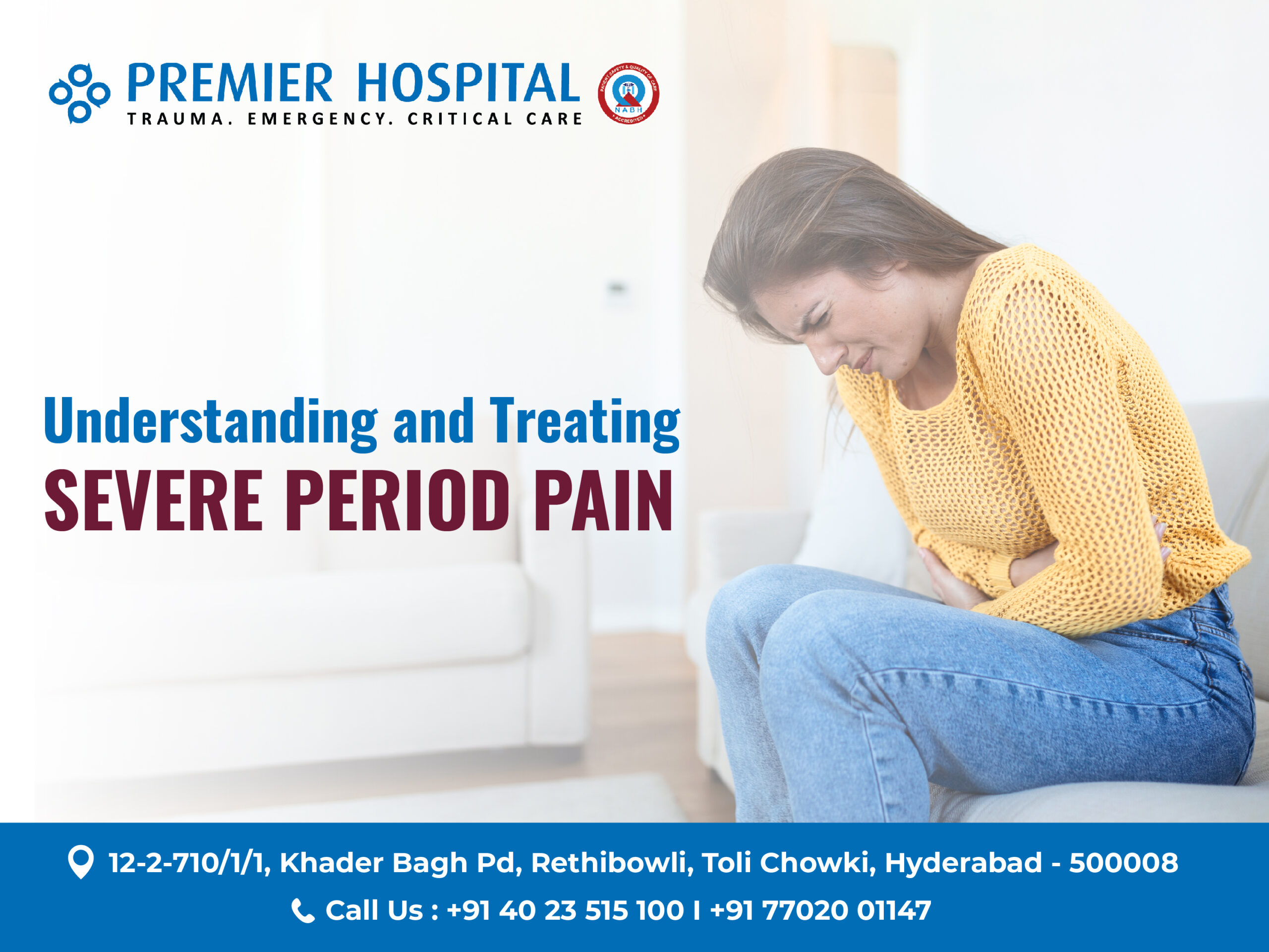Period Pain Doesn’t Have to Rule Your Life: Understanding and Treating Severe Period Pain
by Premier Hospitals | June 12, 2024 |
Period Pain Doesn't Have to Rule Your Life: Understanding and Treating Severe Period Pain
Period pain, medically known as dysmenorrhea, is a common yet often misunderstood experience for many individuals. While mild cramping and discomfort during menstruation can be considered normal, severe pain that disrupts daily life is not. Understanding the signs of severe dysmenorrhea and seeking appropriate medical advice is crucial for maintaining a good quality of life
Table Of Contents
- Recognizing Severe Dysmenorrhea
- Debunking Period Pain Misconceptions
- Treatment Options for Dysmenorrhea
- Conclusion:
Recognizing Severe Dysmenorrhea
Severe menstrual pain can significantly impact your daily activities, work, and overall well-being. Here are some critical signs that indicate the need for medical attention- Debilitating Cramping: If you find yourself curled up in bed for hours or even days, unable to move due to intense cramping, this is a significant sign of concern.
- Extreme Pain:Pain so severe that it causes you to scream or cry is not typical menstrual discomfort and should be addressed by a healthcare professional. Experiencing vomiting and severe diarrhea along with cramps indicates that your period pain might be more than just a normal part of menstruation.
- Emotional Impact: Severe mood swings or feelings of depression that coincide with your menstrual cycle can affect your overall well-being and are worth discussing with your doctor.
- Prolonged Pain: Cramps that start before your period, last throughout it, or continue after it ends are not normal and need medical attention. Intense cramps occurring outside of your menstrual period are also a cause for concern and should be evaluated by a gynecologist. Ignoring severe menstrual pain can lead to a lower quality of life and may indicate underlying health issues such as endometriosis or fibroids. A gynecologist can help diagnose the cause of your pain and suggest appropriate treatments. These treatments may include medication, lifestyle changes, or, in some cases, surgery
Debunking Period Pain Misconceptions
There are numerous myths surrounding dysmenorrhea that often downplay the severity of the condition and hinder individuals from seeking proper treatment. Here are some prevalent myths and the truths behind them- Myth 1 Period Pain is Always Normal Reality: While mild cramping and discomfort can be a normal part of menstruation, severe pain that disrupts daily activities is not. Intense pain could indicate underlying health conditions like endometriosis or fibroids and should be evaluated by a healthcare professional.
- Myth 3 It's Just a Part of Being a Woman Reality: Severe menstrual pain should not be dismissed as an inevitable part of womanhood. There are effective treatments available, and no one should have to endure debilitating pain without seeking medical advice.
- Myth 4 Menstrual Pain Only Happens During the Period Reality: Dysmenorrhea can occur before, during, and even after menstruation. Pain outside of the menstrual period can be a sign of other conditions and should be investigated by a gynecologist.
- Myth 5 Diet and Exercise Have No Impact Reality: While diet and exercise are not cure-alls, they can influence menstrual pain. Regular physical activity, a balanced diet, and certain nutritional supplements may help alleviate some symptoms. However, they should be part of a comprehensive treatment plan.
- Myth 6 It's All in Your Head Reality: Dysmenorrhea is not psychological; it has real physiological causes. Suggesting that period pain is "all in your head" dismisses the genuine discomfort and suffering experienced by those with the condition.
Treatment Options for Dysmenorrhea
There are several treatment options available for managing and alleviating dysmenorrhea- Medications: Over-the-counter pain relievers such as ibuprofen or naproxen can help manage mild to moderate pain. For severe pain, a doctor might prescribe stronger medications or hormonal treatments such as birth control pills, which can regulate or reduce menstrual flow and alleviate cramps.
- Lifestyle Changes:Regular physical activity can help reduce the severity of cramps. Activities like yoga, stretching, and light aerobic exercises can increase blood flow and reduce tension in the muscles. A balanced diet rich in fruits, vegetables, whole grains, and lean proteins can also contribute to overall health and reduce inflammation.
- Heat Therapy: Applying heat to the lower abdomen using a heating pad or hot water bottle can relax the muscles and relieve cramping.
- Alternative Therapies: Some individuals find relief through alternative therapies such as acupuncture, acupressure, or chiropractic care. These treatments can help improve blood flow and reduce pain.
- Surgical Options: In cases where dysmenorrhea is caused by conditions like endometriosis or fibroids, surgical intervention may be necessary. Procedures like laparoscopy can remove or reduce the growths causing pain.
- Cognitive Behavioral Therapy (CBT): For those whose pain is exacerbated by stress or anxiety, CBT can help manage the emotional and psychological aspects of dysmenorrhea.





